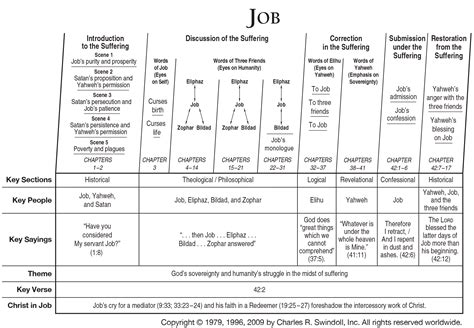The Book Of Job Explained

The Book of Job is an ancient text found within the Hebrew Bible and the Christian Old Testament. It is a profound literary masterpiece, offering a deep exploration of the human condition, faith, and the mysteries of divine justice. With its timeless themes and thought-provoking narrative, the Book of Job has captivated scholars, theologians, and readers for centuries. In this comprehensive article, we delve into the intricacies of this biblical book, uncovering its historical context, key characters, profound philosophical debates, and its enduring relevance in modern times.
The Narrative: A Tale of Suffering and Faith

At its core, the Book of Job tells the story of a righteous man, Job, who endures immense suffering and loss. The narrative unfolds in three distinct parts: a prologue, the main body, and an epilogue. In the prologue, we are introduced to Job, a wealthy and upright individual, beloved by God. Satan, granted permission by God, tests Job’s faith by bringing about a series of devastating calamities, stripping him of his wealth, family, and even his health.
The main body of the book is a dialogue between Job and his three friends, Eliphaz, Bildad, and Zophar. They engage in a philosophical debate, attempting to make sense of Job's suffering. They argue that Job's misfortune must be a result of his sins, a common belief at the time. Job, however, maintains his innocence and questions the justice of God's actions.
As the dialogue progresses, a fourth character, Elihu, enters the scene, offering his own interpretation. Elihu believes that Job's suffering is a form of divine discipline, meant to bring him closer to God. He asserts that God's wisdom and power are beyond human comprehension, and Job should submit to His will.
Job’s Soliloquy: A Cry for Understanding

One of the most powerful and poignant sections of the Book of Job is Job’s soliloquy. In a series of passionate speeches, Job expresses his anguish, frustration, and longing for an explanation. He questions the apparent injustice of his situation, declaring his innocence and pleading for God’s attention.
"Oh, that I knew where I might find him, that I might come even to his seat! I would lay my case before him and fill my mouth with arguments. I would know what he would answer me and understand what he would say to me."
— Job 23:3-4
Job's soliloquy showcases the depth of his emotional turmoil and his desperate search for meaning in the midst of suffering. It resonates with readers across time, as many can relate to the experience of feeling misunderstood or abandoned by God during difficult times.
The Divine Response: A Revelation of God’s Majesty
In the epilogue, God finally responds to Job’s cries. Rather than providing a direct answer to Job’s questions, God presents a series of rhetorical questions, inviting Job to consider the vastness and complexity of His creation.
"Where were you when I laid the foundation of the earth?... Have you commanded the morning since your days began, and caused the dawn to know its place?"
— Job 38:4, 12
Through this revelation, God reveals His sovereignty and the limitations of human understanding. Job, humbled by the awe-inspiring display of God's power, realizes the futility of questioning His ways. He accepts that suffering is a part of life, and faith requires trust in God's wisdom and justice.
Theological Insights and Impact
The Book of Job has had a profound influence on theological thought and discourse. It challenges the simplistic notion that suffering is always a consequence of sin, and instead, presents a more nuanced understanding of divine justice. The book encourages readers to wrestle with difficult questions, fostering a deeper appreciation for the complexities of faith and the human experience.
Moreover, the Book of Job has inspired countless works of art, literature, and philosophy. Its themes of suffering, faith, and the human condition continue to resonate in modern culture, providing a timeless lens through which we can examine our own struggles and find solace in the shared human experience.
Modern Relevance and Interpretations

In today’s world, the Book of Job remains relevant, offering guidance and comfort to those facing adversity. It reminds us that suffering is a universal experience and that even in the darkest moments, faith can provide a source of strength and hope.
Modern interpretations of the book often focus on the psychological aspects of Job's journey. Some scholars see Job's story as a reflection of the human struggle to find meaning and purpose in a world that often seems unjust. Others emphasize the book's exploration of theodicy, the philosophical attempt to reconcile the existence of an all-powerful, benevolent God with the presence of evil and suffering in the world.
Conclusion: A Timeless Exploration of Faith
The Book of Job stands as a testament to the enduring power of religious literature. Its profound insights into the human condition, faith, and divine justice continue to inspire and challenge readers across generations. As we navigate our own journeys of faith and doubt, the Book of Job offers a guiding light, reminding us of the resilience of the human spirit and the ultimate sovereignty of God.
What is the central theme of the Book of Job?
+The Book of Job explores the themes of suffering, faith, and divine justice. It questions the assumption that suffering is always a result of sin and challenges readers to consider the complexities of God’s ways.
How does the Book of Job influence modern theological thought?
+The Book of Job has had a significant impact on theological discourse, challenging simplistic notions of divine justice. It encourages a deeper understanding of faith, suffering, and the human condition, fostering a more nuanced appreciation for religious beliefs.
What can we learn from the Book of Job’s portrayal of suffering and faith?
+The Book of Job teaches us that suffering is a universal experience and that faith can provide strength and solace during difficult times. It reminds us of the resilience of the human spirit and the ultimate sovereignty of God in the face of life’s challenges.



